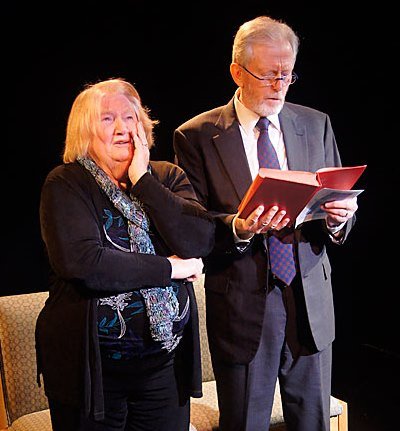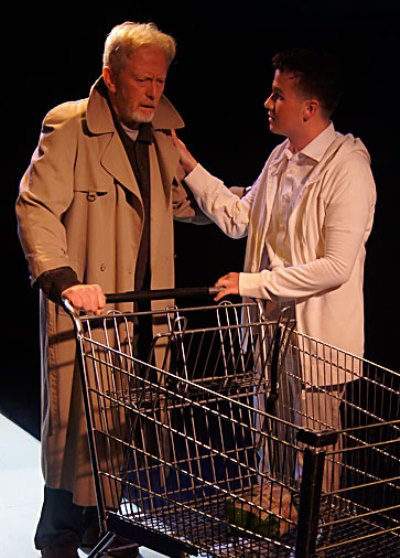‘Going to a Place’ with ice cream for eternity, but where dialogue and plausibility are thin
Review: “Going to a Place Where You Already Are” by Bekah Brunstetter, at Redtwist Theatre through July 23. ★★
By Lawrence B. Johnson
There’s a native directness about veteran Kathleen Ruhl’s acting that never fails to connect the viewer to her character. Call it authenticity. But no amount of straight shooting from the stage can magically turn a weak play into something terrific. Ruhl has demonstrated that proposition in two different plays in recent weeks — currently in Bekah Brunstetter’s “Going to a Place Where You Already Are” at Redtwist Theatre.
 As it happens, both Brunstetter’s play and Ruhl’s other dubious outing, her daughter Sarah Ruhl’s “For Peter Pan on Her 70th Birthday” produced by Shattered Globe Theatre, deal with an elderly woman who is dying, the associated agonies of her family and the allure of Neverland – metaphorically in the one instance and in the no less wishful, albeit more accepted, religious sense in the play at hand.
As it happens, both Brunstetter’s play and Ruhl’s other dubious outing, her daughter Sarah Ruhl’s “For Peter Pan on Her 70th Birthday” produced by Shattered Globe Theatre, deal with an elderly woman who is dying, the associated agonies of her family and the allure of Neverland – metaphorically in the one instance and in the no less wishful, albeit more accepted, religious sense in the play at hand.
I don’t intend to revisit Sarah Ruhl’s modest (now closed) drama here, except to say that it t lacks development and cohesion. Like “Going to a Place Where You Already Are,” that Peter Pan gambit starts from an intriguing premise; yet neither play travels very far dramatically or psychologically or, indeed, philosophically.
Kathleen Ruhl portrays the terminally ill character in both plays. In “Going to a Place,” we meet Roberta (Ruhl) and her husband Joe (Art Fox) at a church funeral service where they chortle together over references to eternity, heaven, divine grace and all that. But a community singing of “How Great Thou Art” elicits a quiet confession from Roberta: She’s not so skeptical as her husband, a confirmed atheist who insists that beyond this life there is only dust and nothingness. Roberta also reveals that she’s been experiencing intense pain in her back lately.
 We soon learn that she has terminal cancer. Her husband goes into acute denial. They will get treatment for her. She will beat this. But Roberta is resigned, and failing fast – so fast that in one brush with death she glimpses the other side: heaven itself, even an angel, who then drops in on her from time to time, always with a cheerful message about how great it’s going to be when she finally joins the eternally contented.
We soon learn that she has terminal cancer. Her husband goes into acute denial. They will get treatment for her. She will beat this. But Roberta is resigned, and failing fast – so fast that in one brush with death she glimpses the other side: heaven itself, even an angel, who then drops in on her from time to time, always with a cheerful message about how great it’s going to be when she finally joins the eternally contented.
Her husband doesn’t buy in. But more to the point, at least in Fox’s performance under the direction of Matt Hawkins, he becomes steadily less interesting. He rejects the whole package of God, heaven and eternal life but without advancing a philosophical argument. Scoffing does not, in itself, make for especially engaging dialogue. Fox delivers the goods, however, in one arresting moment when Joe is wandering – like a lost soul – in a supermarket, by now sure he’s losing his beloved wife and literally not knowing which way to turn.
Roberta’s embrace of an afterlife seems too facile and convenient. In part, the problem lies in the angel factor. Collin Quinn Rice makes a very sweet, compassionate angel; and I suppose if one can accept the intervention of Clarence in “It’s a Wonderful Life,” one should also be able to roll with this reassuring wraith. But the playwright’s childish concept of heaven – there’s even a ’50s soda shop and the promise of perpetual sundaes – is just too cute. Somewhere in the course of this play, all thinking seems to have ceased.
 Then there’s the ineffectual contrivance of the young couple: the rather petulant girl Ellie (Abby Dillion), Roberta’s granddaughter, and Ellie’s one-night stand, a paraplegic (Joel Rodriguez) who wants to pursue the relationship but is rebuffed the morning after by his temperamental paramour.
Then there’s the ineffectual contrivance of the young couple: the rather petulant girl Ellie (Abby Dillion), Roberta’s granddaughter, and Ellie’s one-night stand, a paraplegic (Joel Rodriguez) who wants to pursue the relationship but is rebuffed the morning after by his temperamental paramour.
Between our straw lovers, dialogue bottoms out. Probability takes a beating, as well, when these fleeting acquaintances end up…but I won’t spoil that. I will say that the playwright commits a fairly egregious oversight with regard to Ellie, who describes herself in decisive terms as a bad person – though we see not a shred of evidence for this harsh self-rebuke. She smokes. There is that. And she lies about it. In the end – or perhaps the beginning, in Roberta’s transmigratory case – Ellie also sees the light, and implausibility soars to new heights.
Even Roberta’s husband, that old skeptic, comes around for a proper send-off.
But just think of it: an eternity of whipped cream and maraschino cherries. Deep stuff.
Related Links:
- Performance location, dates and times: Details at TheatreinChicago.com
- Complete lineup of plays for Redtwist’s 2017-18 season: Get the details here
Tags: Abby Dillion, Art Fox, Bekah Brunstetter, Joel Rodriguez, Kathleen Ruhl, Matt Hawkins, Redtwist Theatre, Sarah Ruhl


